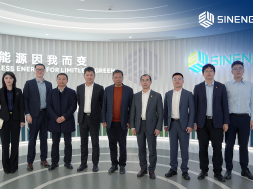
PLI scheme for ACC battery storage: Reliance New Energy, Ola, Rajesh Exports sign pact – EQ Mag Pro
The government has signed a programme agreement with Reliance New Energy, Ola and Rajesh Exports under the PLI Scheme for ACC Battery Storage
- These companies will receive incentives under India’s Rs 18,100-crore PLI scheme
- The private players are expected to create battery manufacturing capacity to the tune of ~95 GWh
New Delhi: The government has signed a programme agreement with Reliance New Energy Limited, Ola Electric Mobility Private Limited and Rajesh Exports Limited under the PLI (Production Linked Incentive) Scheme for ACC (Advanced Chemistry Cell) Battery Storage, an official statement said on Friday. “Three selected bidders signed the Programme Agreement under Production Linked Incentive (PLI) Scheme for Advanced Chemistry Cell (ACC) Battery Storage here on 28th July, 2022,” the statement said.
Commenting on the PLI Scheme for ACC Battery Storage, Union Minister for Heavy Industries Dr Mahendra Nath Pandey said, “This embarks a new chapter in India’s manufacturing industry as we set the vision for battery manufacturing and compete globally with other nations in this sunrise sector. This will be favourable to EV ecosystem and energy storage market as it will support the demand for EVs and renewable and attract investment in this sector. Today big companies are investing in battery manufacturing in India. We should support them and make India a truly global manufacturing hub. This will also help us to achieve India’s commitment to Panchamrit given by Hon’ble PM Modi ji in COP 26.”
ACC battery storage PLI scheme
These companies will receive incentives under India’s Rs 18,100-crore PLI programme. In addition to the capacities allocated by the Ministry of Heavy Industries under the scheme, the private players are expected to create battery manufacturing capacity to the tune of ~95 GWh.
A total of 10 bids were received from companies with manufacturing capacity of 128 GWh under the PLI scheme for ACC Battery Storage. Under the ACC PLI programme, the manufacturing facility would have to be set up within a period of two years. The incentive will be disbursed thereafter over a period of five years on sale of batteries manufactured in India.
Consistent policy support from govt: MoS
Minister of State (MoS) Krishna Pal also congratulated the bidders who signed the programme agreement. He said, “The government over the last few years has provided consistent policy and regulatory support and enabling frameworks for the development of the EV ecosystem in the country, ranging from FAME II, PLI Scheme for Auto and Auto components and battery manufacturing.”
During the occasion, Ministry of Heavy Industries Secretary Arun Goel said, “MHI has successfully completed the signing of PLI ACC Programme in a record time of 13 months (Gazette Notified- June 2021 and Programme Agreement Signed- July 2022) to promote battery manufacturing in the country in the middle of the pandemic. Now it’s time for private players to take the lead and become global champions and also make the country a global hub in the energy storage segment. My best wishes to them on the journey ahead.”
Domestic value addition
The government has approved the Production Linked Incentive (PLI) Scheme ‘National Programme on Advanced Chemistry Cell (ACC) Battery Storage’ for achieving manufacturing capacity of Fifty (50) Giga Watt Hour (GWh) of ACC for Enhancing India’s manufacturing capabilities with a budgetary outlay of Rs 18,100 crore. Under the said initiative, the emphasis of the government is to achieve greater domestic value addition, while at the same time ensure that the levelised cost of battery manufacturing in India is globally competitive.
The programme is designed in such a manner that it is technology agnostic in nature and hence only focus on the desired output of the batteries. Thereby, the beneficiary firm shall be free to choose suitable advanced technology and the corresponding plant and machinery, raw material, and other intermediate goods for setting up cell manufacturing facility to cater to any application.
The programme expects an investment that will boost domestic manufacturing and also facilitate battery storage demand creation for both electric vehicles and stationary storage along with the development of a complete domestic supply chain and Foreign Direct Investment (FDI) in the country. The ACC PLI scheme is expected to directly impact the saving to the nation on account of reduction in import of crude-oil to a significant extent and increase the share of renewable at the national grid level.
“This PLI scheme for Advanced Chemistry Cell (ACC) (Rs 18,100 crore) along with the already launched PLI Scheme for automotive sector (Rs 25,938 crore) and Faster Adoption of Manufacturing of Electric Vehicles (FAME) (Rs 10,000 crore) will enable India to leapfrog from traditional fossil fuel-based automobile transportation system to environmentally cleaner, sustainable, advanced and more efficient Electric Vehicles (EV) based system,” said the statement.
















